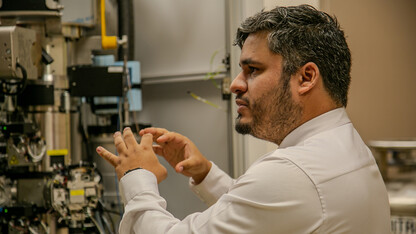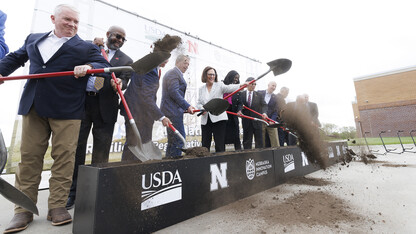· 4 min read
PKI plan to focus on business needs in Omaha, state
The mission of the University of Nebraska’s Peter Kiewit Institute to serve Omaha and Nebraska through education, research and outreach is clear and more important than ever – and can be achieved with modest operational adjustments, integrated strategic planning, ambitious investments and implementation of specific benchmarks for success, NU leaders said Sept. 20.
The chancellors of UNL and the University of Nebraska at Omaha presented a plan for PKI during the Board of Regents meeting. Their presentation followed an external review earlier this year that concluded that the Peter Kiewit Institute, while successful, has not achieved its full potential.
In accepting the plan of NU leadership to move PKI to the next level, the Board of Regents requested an integrated strategic plan for the institute that will include benchmarks for enrollment, program development, faculty hiring and engagement with business and industry.
The plan – to build on the strategic plans of PKI’s two affiliate colleges, the UNO College of Information Science and Technology and the UNL College of Engineering; as well as an NU/Greater Omaha Chamber of Commerce assessment of workforce demands – will be submitted to the Board’s Academic Affairs Committee by Dec. 31. It will be developed by the PKI Academic Advisory Council, which includes the deans of those two colleges, the executive director of the Peter Kiewit Institute, and the senior vice chancellors for academic affairs at UNL and UNO.
“Over its nearly 20-year history, the Peter Kiewit Institute has enjoyed much success in meeting the education and research needs of businesses in Omaha and throughout Nebraska. But it is clear that PKI could be doing even more to serve Omaha and the state,” University of Nebraska President James B. Milliken said. “Plans reviewed today will advance the university’s ambitious goals and will help us meet the information science, technology and engineering needs in Omaha and Nebraska – now and well into the future.”
Regent Bob Whitehouse, chair of the Academic Affairs Committee, said: “The Board of Regents takes seriously its responsibility to ensure that the University of Nebraska is providing high-quality education to its students, generating a talented workforce for Nebraska, and engaging in productive relationships with the private sector. The Board is fully committed to the success of the Peter Kiewit Institute and supports the plans to develop strategies for PKI to realize its full potential. Moving forward, we will regularly monitor the institute’s performance to ensure that appropriate benchmarks are established and met so that the university is providing the education, research and service that Omaha and Nebraska expect and deserve.”
Tim Wei, dean of the UNL College of Engineering, and Hesham Ali, dean of the UNO College of Information Science and Technology, already have established specific goals that will support a stronger Peter Kiewit Institute. Those include:
Investment in a single, competitive College of Engineering with a significantly larger presence in Omaha that meets workforce needs in the metropolitan area and the state.
Increasing undergraduate enrollment in engineering from 2,700 to 3,600 in the next five years, including growing enrollment in Omaha-based engineering programs by 400 students, a 50 percent increase.
Expanding an Omaha-based Master of Engineering degree for working professionals.
- Adding 50 new faculty lines in engineering over the next five years, including 30 in Omaha, a 70 percent increase.
- Expanding engagement with leading Omaha-area companies, including Kiewit, Union Pacific, ConAgra Foods and HDR Inc.
- Creating summer workshops and internship opportunities for talented high school students interested in information technology.
- Growing enrollment in information science and technology by 10 percent in the next three years, including a 20 percent increase in enrollment of women; and increasing the six-year graduation rate by 30 percent.
- Growing research funding in the College of Information Science & Technology to $10 million by 2020.
Those goals will be integrated into the broader plan for the Peter Kiewit Institute, which Milliken said will foster greater collaboration and ensure that appropriate campus leadership is engaged in and has a stake in PKI’s success.







